|
|
|
Sort Order |
|
|
|
Items / Page
|
|
|
|
|
|
|
| Srl | Item |
| 1 |
ID:
188432
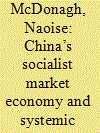

|
|
|
|
|
| Summary/Abstract |
There is growing debate over whether China’s economic model can be managed within the rules of the multilateral trade system, a debate with major implications for international order. Critics argue that the China model is a systemic rival to the liberal trade order, a view that implies future decoupling. For those who reject the rivalry view, the default position is to propose more trade agreements with China, with the goal of driving liberal reforms in the country. This article engages the debate by contributing a conceptually informed and empirically supported analysis of China’s institutional development. Combining ‘second image’ insights with a comparative capitalism framework helps explain why nations evolve distinct varieties of market economy, which then shape their multilateral preferences. Applying these insights to China’s institutional development suggests two things: (1) the country is in transition to a socialist, rather than liberal, market economy, grounded in a fundamentally different legal and normative order; (2) the socialist market economy shapes Chinese preferences towards challenging the liberal trade order at a systemic level (i.e. over the rules of the game, rather than within them). Empirically, the article highlights two modes of systemic contestation by China that confirm the paper’s conceptual expectations.
|
|
|
|
|
|
|
|
|
|
|
|
|
|
|
|
| 2 |
ID:
164366
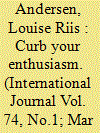

|
|
|
|
|
| Summary/Abstract |
The future looks post-Western. But will it also be post-liberal? To gauge how and by whom liberal internationalism may be sustained in the coming order, the article provides a critical and historically grounded analysis of the role of the United Nations in the fading US-led order and the ordering potential and role of middle powers. The article suggests that in the current interregnum of global governance the conventional distinction between traditional and emerging middle powers is increasingly unhelpful. What matters is not their past history, but their present proclivity for seeking multilateral, negotiated solutions. It is this pragmatic version of liberal internationalism that may have a future in a post-Western world, and open up a more pluralist, inclusive approach to global governance.
|
|
|
|
|
|
|
|
|
|
|
|
|
|
|
|
| 3 |
ID:
158383
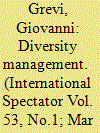

|
|
|
|
|
| Summary/Abstract |
The ongoing redistribution of power on the international stage points to a more decentred international system featuring a multiplication of governance arrangements. A larger range of pivotal countries have the capacity and the confidence to pursue different priorities, a development that questions the prevalent post-Cold War expectation that the liberal international order would grow both wider and deeper. The central challenge for the future of the international order is managing diversity in ways that minimise conflict and leverage the benefits of interdependence. The evolution of regionalism and regional orders will be a critical dimension of the realignment of power, interests and normative agendas at the global level. Both more competition and more cooperation are likely to take place at the regional level, with the mix changing in different parts of the world. Provided that it is not merely a cover for coercive hegemonic aspirations and that it is designed to complement other levels of cooperation, regionalism can play an important role in preventing a more polycentric world from becoming a more fragmented and unstable one.
|
|
|
|
|
|
|
|
|
|
|
|
|
|
|
|
| 4 |
ID:
154834


|
|
|
|
|
| Summary/Abstract |
Given the widely shared belief that, following a long period of crisis, the American-led liberal world order is now in transition, the question arises: what comes next? Considering China’s ‘parallel order-shaping’ project with respect to the liberal order as a harbinger of a ‘multi-order world’, it is reasonable to expect a concert-like mode of ordering, which will draw on a new common language to reach consensus among proactive stakeholders at the global level. Those interested in maintaining the liberal character of this arrangement, such as the EU, should therefore steadily engage in the process leading to its establishment in order to gain and retain full membership while enhancing their discursive power.
|
|
|
|
|
|
|
|
|
|
|
|
|
|
|
|
| 5 |
ID:
185241
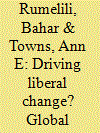

|
|
|
|
|
| Summary/Abstract |
The existing literature on Global Performance Indices (GPIs) is mostly dominated by unit-level analyses focused on specifying the relevant properties of the GPIs and the motivations of state actors in being influenced by GPIs. This article advances a systemic approach, which conceives of GPIs as collectively constituting a system of normative stratification in International Relations (IR). By bringing together the literature on GPIs with the relevant IR literatures on international hierarchies and status-seeking, we identify the structural attributes of the GPI-based system of stratification, how these structural attributes shape the distribution of normative status positions among states, and how this distribution is likely to condition the pursuit of status by states. In particular, we argue that the disaggregated structure and relative ranking of states, respectively, generate status ambiguity and immobility, which both dissuade states from seeking higher moral status through improving their scores in the existing indices. We illustrate the patterns of status ambiguity and immobility present in the GPI-based system of stratification through an empirical analysis of the scores and rank positions of the United States, European Union (EU) members, and “rising powers” in five different indices in the past decade.
|
|
|
|
|
|
|
|
|
|
|
|
|
|
|
|
| 6 |
ID:
158385
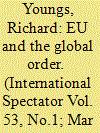

|
|
|
|
|
| Summary/Abstract |
Politicians, diplomats and analysts commonly assume that commitment to multilateralism and liberal norms is part of the EU’s very DNA. Increasingly, however, the EU’s commitment to the liberal global order is more selective. We demonstrate the shift to a more contingent liberalism by examining the EU’s recent record in relation to four different challenges: international trade; US leadership; Russian actions in the eastern neighbourhood; and security in the Middle East. We speculate on what this may portend for the EU’s self-identity, European interests and the integrity of the prevailing global order.
|
|
|
|
|
|
|
|
|
|
|
|
|
|
|
|
| 7 |
ID:
164539
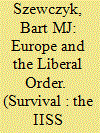

|
|
|
|
|
| Summary/Abstract |
If the liberal order is a European strategic interest, it behoves Europe to defend it.
|
|
|
|
|
|
|
|
|
|
|
|
|
|
|
|
| 8 |
ID:
163308
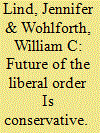

|
|
|
|
|
| Summary/Abstract |
The liberal world order is in peril. Seventy-five years after the United States helped found it, this global system of alliances, institutions, and norms is under attack like never before. From within, the order is contending with growing populism, nationalism, and authoritarianism. Externally, it faces mounting pressure from a pugnacious Russia and a rising China. At stake is the survival of not just the order itself but also the unprecedented economic prosperity and peace it has nurtured
|
|
|
|
|
|
|
|
|
|
|
|
|
|
|
|
| 9 |
ID:
184952
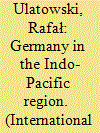

|
|
|
|
|
| Summary/Abstract |
In the twenty-first century, the Indo-Pacific region became the focal point of great power competition. In 2020, Germany published its ‘Policy guidelines for the Indo-Pacific. Germany—Europe—Asia: shaping the twenty-first century together’. The publication of the Indo-Pacific guidelines and the deployment of frigate Bayern to the Indo-Pacific in early August 2021 offer a starting point for a discussion on a German grand strategy in the post-liberal world order. This article argues that the publication of the German Indo-Pacific guidelines and Germany's increased engagement in the region are a consequence of a change in how Germany perceives China. In the first decade of the twenty-first century, the rise of China was seen as an opportunity for Germany, but this has changed, with China now increasingly seen as a threat to Germany's national interests. Consequently, Germany is strengthening its cooperation with like-minded countries in Asia and is engaging in soft balancing against China. Germany's Defence Minister Annegret Kramp-Karrenbauer stops short of using the word alliance, calling for ‘an international network of like-minded countries’ and also stops short of declaring a containment strategy against China, saying that Germany works together with China where this is possible, but digs its heels in against China where it has to.
|
|
|
|
|
|
|
|
|
|
|
|
|
|
|
|
| 10 |
ID:
164368
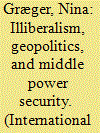

|
|
|
|
|
| Summary/Abstract |
Middle powers have played a key role in supporting global governance, a rules-based order, and human rights norms. Apart from conveying and effectuating global solidarity and responsibility, multilateral cooperation has been an arena where middle powers seek protection and leverage relatively modest power to greater effect, sometimes as “helpful fixers” to great powers. This article argues that geopolitical revival and the contestation of the liberal order are challenging middle powers' traditional sheltering policies, based on empirical evidence from the Norwegian case. First, the weakening of multilateral organizations is making middle powers more vulnerable to great power rivalry and geopolitics, and Norway's relationship with Russia is particularly pointed. Second, existing shelters such as NATO and bilateral cooperation with the US are negatively affected by the latter's anti-liberal foreign policies, making looser sheltering frameworks important supplements. While Norway's and other middle powers' traditional policies within the “soft power” belt may continue, “doing good” may become less prioritized, due to the need for security.
|
|
|
|
|
|
|
|
|
|
|
|
|
|
|
|
| 11 |
ID:
130470


|
|
|
|
|
| Publication |
2014.
|
| Summary/Abstract |
Walter Russell Mead paints a disturbing portrait of the United States' geopolitical predicament. As he sees it, an increasingly formidable coalition of illiberal powers -- China, Iran, and Russia -- is determined to undo the post-Cold War settlement and the U.S.-led global order that stands behind it. Across Eurasia, he argues, these aggrieved states are bent on building spheres of influence to threaten the foundations of U.S. leadership and the global order. So the United States must rethink its optimism, including its post-Cold War belief that rising non-Western states can be persuaded to join the West and play by its rules. For Mead, the time has come to confront the threats from these increasingly dangerous geopolitical foes.
|
|
|
|
|
|
|
|
|
|
|
|
|
|
|
|
| 12 |
ID:
158388
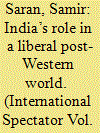

|
|
|
|
|
| Summary/Abstract |
After a period of significant gains, achieved largely through the establishment of institutions that promoted international liberalism, the global order today finds itself at a crucial juncture. Rising inequality, the proliferation of nationalist politics, technology-induced disruptions and the resurgence of zero-sum geopolitics, are all beginning to shake the foundations of the global governance architecture built assiduously over the past 70 years. It is clear that the liberal order, as it is frequently referred to, will not be able to sustain its influence in the 21st century unless it finds new torchbearers in Asia, where politics and economics are scripting a story very different from that of post-war Europe. To some, it is evident that India, which has successfully combined economic growth with its own liberal traditions, will indeed be the heir to and guarantor of this system as an emerging and leading power.
|
|
|
|
|
|
|
|
|
|
|
|
|
|
|
|
| 13 |
ID:
177070


|
|
|
|
|
| Summary/Abstract |
Most explanations for the crisis of the liberal order revolve around geopolitics, globalization, economic resentment fueling new forms of populism and nationalism, and Western states following their interests away from liberal values and institutions of their creation. But international orders are produced and legitimated by both material and spiritual forces. The spirit in liberalism is moral progress defined by practices of humanity. If the Liberal International Order (LIO) is in decline, then perhaps we should consider its moral foundations. Section “Introduction” briefly introduces the question of international order, categorizes international relations theories according to the mixture of consent and coercion, and how legitimacy often refers not only to the existing order but a vision of progress. This is particularly true of the liberal international order. Section “International Order, Legitimacy, and Progress” turns to the liberal international order, progress, and the possible spiritual decline of the liberal international order. After briefly considering the liberal in international liberalism and the late 20th-century emergence of the liberal international order, I argue that one reason for its declining moral foundations is because of the pronounced individualism that resides at the heart of the contemporary international order. In other words, the sources of decline are not exogenous but rather part of liberalism. The Conclusion asks: what is next? The conjunction of the decline of the LIO and COVID-19 has complicated the debate about the future international order, and much of the conversation hinges on whether and how the United States can recover from its self-destructive tendencies and China’s intentions. But where is the spirit of moral progress and humanity in this discussion?
|
|
|
|
|
|
|
|
|
|
|
|
|
|
|
|
| 14 |
ID:
167169


|
|
|
|
|
| Summary/Abstract |
The Belt and Road Initiative (BRI), formerly known as One Belt One Road (OBOR), has emerged as one of the top priorities for Chinese President Xi Jinping ever since he unveiled the initiative in 2013. This special issue surveys the reception of BRI in East Asia. As China’s immediate neighborhood, this region will play an important role in determining whether Beijing’s signature project will succeed in the mid- to long term. However, research has thus far mostly focused on BRI’s reception in Central Asia and (Eastern) Europe. In this introduction, we first provide an overview of the literature by identifying three main strands of interpretation on BRI, namely those focusing on geoeconomics, on geopolitics, and on international norms as well as order. Next, we provide a review of the contemporary research on both Southeast Asian and Northeast Asian perceptions of and policy responses to BRI. Finally, we discuss research gaps in the literature and provide an overview of case studies and findings in this special issue. We conclude by identifying recurring themes and characteristics in East Asian responses to BRI.
|
|
|
|
|
|
|
|
|
|
|
|
|
|
|
|
| 15 |
ID:
151329
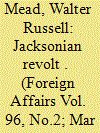

|
|
|
|
|
| Summary/Abstract |
For the first time in 70 years, the American people have elected [2] a president who disparages [3] the policies, ideas, and institutions at the heart of postwar U.S. foreign policy. No one knows how the foreign policy of the Trump administration will take shape, or how the new president’s priorities and preferences will shift as he encounters the torrent of events and crises ahead. But not since Franklin Roosevelt’s administration has U.S. foreign policy witnessed debates this fundamental.
|
|
|
|
|
|
|
|
|
|
|
|
|
|
|
|
| 16 |
ID:
158382
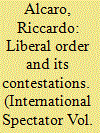

|
|
|
|
|
| Summary/Abstract |
The notion that we are experiencing a change in times whereby an old ‘order’ of the world is giving way to a new era has been gaining legitimacy in international debates among experts, policymakers and practitioners. Such debates are as animated as they are inconclusive in their outcomes. The contours of the upcoming era remain vague, its structure and contents undefined, its direction uncertain. Grim predictions of renewed great power competition as we have not seen since the end of the Cold War or even World War II or of an increasingly fragmented and ungovernable world abound. They co-exist though with less disheartening expectations of future global re-alignments eventually providing order. In the face of such divergent opinions, imagining the future at times looks like an act of divination.
|
|
|
|
|
|
|
|
|
|
|
|
|
|
|
|
| 17 |
ID:
152583
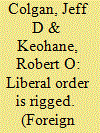

|
|
|
|
|
| Summary/Abstract |
Prior to 2016, debates about the global order mostly revolved around its structure and the question of whether the United States should actively lead it or should retrench, pulling back from its alliances and other commitments. But during the past year or two, it became clear that those debates had missed a key point: today’s crucial foreign policy challenges arise less from problems between countries than from domestic politics within them. That is one lesson of the sudden and surprising return of populism to Western countries, a trend that found its most powerful expression last year in the United Kingdom’s decision to leave the EU, or Brexit, and the election of Donald Trump as U.S. president.
|
|
|
|
|
|
|
|
|
|
|
|
|
|
|
|
| 18 |
ID:
132905


|
|
|
|
|
| Publication |
2014.
|
| Summary/Abstract |
Following the end of the Cold War, South Asia has been in transition in a number of ways. Based on the Kantian tripod of democracy, economic interdependence and institution, this article assesses whether liberal peace has taken root in South Asia. It concludes that although an incipient liberal order may be discerned in the region, South Asia has yet to change fundamentally to become a zone of liberal peace. Particularly the Indo-Pakistani relationship remains frosty which constrains the building of a liberal order in the region.
|
|
|
|
|
|
|
|
|
|
|
|
|
|
|
|
| 19 |
ID:
158389


|
|
|
|
|
| Summary/Abstract |
While espoused by the newly independent states after the collapse of the Soviet Union, the liberal order has not taken root in interstate relations and is now openly contested in Eastern Europe and the South Caucasus. However, the challenges presented (primarily by Russia) to the international order also trigger growing contestation, in several Eastern European and South Caucasus countries, of an existing regional order premised on Russian hegemony. Therefore, the picture that emerges from these multiple contestations is not an alternative regional order, but rather overlapping orders in a fragmented region.
|
|
|
|
|
|
|
|
|
|
|
|
|
|
|
|
| 20 |
ID:
158390
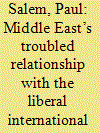

|
|
|
|
|
| Summary/Abstract |
The Middle East has had a complex relationship with the so-called liberal international order. Many peoples and elites of the region welcomed the promise, and promises, of the liberal order after the collapse of the Ottoman Empire, and sought to integrate into it; for other peoples and elites, there have been negative reactions and resistance to it. Today, a majority of countries are integrated, at least nominally, into the global order, while some are decidedly still in systemic challenge with it. The Middle East has also had difficulty in cohering as a region; the condition today is one of collapsed regional order and proxy conflict.
|
|
|
|
|
|
|
|
|
|
|
|
|
|
|
|
|
|
|
|
|